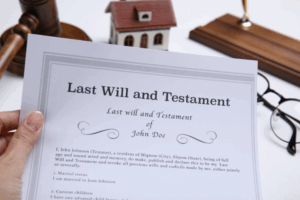“I’d like to have a complex estate plan,” said nobody, ever.
Indeed, overwhelmed by the subject, most people have a goal for their estate plan: they just want something simple, nothing fancy. The challenge with that request is that the estate plan (Will or trust or the like) is a product of the inputs to the plan (the family and the assets) and these inputs can introduce great complexity leading to trade-offs. For example, the best technical solution might introduce additional complexity. Balancing potential complexity with an effective solution to address it is crucial.
So, does the couple actually need a “simple” estate plan? Regrettably, most people are not equipped to know the answer to this question without first consulting an expert who can help determine if a simple plan is appropriate or if a different plan has advantages.
First, what is an estate plan? Put simply, an estate plan is the totality of the documents defining both how to pass assets to loved ones (asset distribution) and how to take care of a person when he or she can no longer care for themselves (personal planning). Typically, it includes a Will, one or more Powers of Attorney, and a Health Care Directive. But is it automatically “simple” because the client wants it to be? Or worse yet, is it “simple” because the client’s financial advisor suggests it should be “simple?”
Let’s look at a “simple” situation. Jacob and Joanne are married with kids, live in Washington, and they have a bank account, a retirement account, and a house. They put beneficiary designations on the bank account and retirement account, so they just need a simple Will to pass the house, right?
Maybe not. If one spouse passes away, do they want everything going to the surviving spouse? If so, perhaps they should also include a Community Property Agreement in addition to the Will. Without fail, Jacob and Joanne would ask: “Why do I need a Community Property Agreement if Washington is a community property state?” This common question underscores the importance of competent advice: the average consumer doesn’t know how vital that document is to an average estate plan in Washington – much more important than a Will.
If Jacob and Joanne are only trying to solve for the house, what other options are available? We mentioned the Will and Community Property Agreement already, but what about a Transfer on Death Deed? Which one is best for Jacob and Joanne to achieve their goals?
Should they include a trust? What kind? A trust for the house? A trust for the kids? Would a trust for the kids be helpful or advantageous somehow even if the children are adults?
But wait there’s more. Should Jacob and Joanne put their oldest child on the bank account (probably not)? Should Jacob and Joanne treat Roth retirement account distributions differently from traditional retirement accounts in the estate plan (maybe)? Is there a way to protect the inheritance for the kids (yes) and is it worth it (maybe)?
Jacob and Joanne may very well end up with a simple estate plan, but that decision should not be reached based on a cursory review of the assets alone. Certainly, an understanding of the assets is vital. But, an understanding of the family members, their dynamics, and the parent’s goals are all important to understand as well. Then, with all this information in hand, the estate planning attorney’s job is to guide Jacob and Joanne through a decision tree of sorts to help them make smart decisions weighing the pros and cons of each potential course of action. Sometimes the decisions made after considering the pros and cons lead to simplicity. But, if it leads to a more complex plan, it is with a firm understanding of the reasons that John and Joanne chose a little more complexity to achieve their goals.
Regrettably, attorneys are expensive, but quick and inexpensive solutions (think online Wills) are often short on thoughtful planning and can cause higher prices on the back end (i.e. after death). For example, had Jacob and Joanne proceeded with a simple Will, they might later pay thousands of dollars more because they failed to include a Community Property Agreement.
A person doesn’t need an attorney for anything in this world…just like a person doesn’t need a dentist for a root canal. But sometimes it’s worth the peace of mind that professionals can provide. For the price of a trip to Costco, Jacob and Joanne can probably sit down with an attorney and determine how to efficiently solve for their particular needs.
**********
The opinions voiced in this material are for general information only and not intended to provide specific advice or recommendations for any individual or entity. This information is not intended to be a substitute for specific individualized tax or legal advice. We suggest that you discuss your specific situation with a qualified tax or legal advisor.












